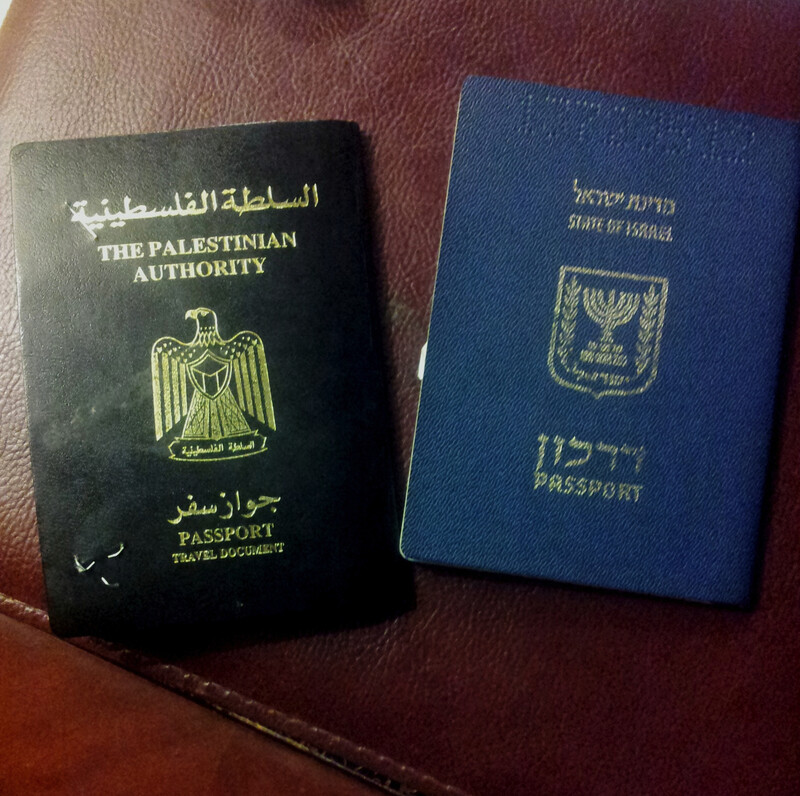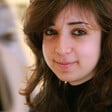13 April 2013
When everyone complained about our Palestinian Authority-issued passports many years ago for, humiliatingly, they would say, not bearing “Palestine” on their covers instead of the words “Palestinian Authority,” I used to think of it as so trivial a matter as arguing on the best way to cut potatoes.
In the years that followed, however, I became increasingly aware that whether or not papers and documents define who we are, these labels and designations pose an array of questions that are, I think, personal, political and philosophical.

At the same time, I have grown exceedingly intolerant of the irreconcilable fact that while I was born, and have always lived, in Gaza, I am also Palestinian, meaning that I come from Palestine too. And while I have always sung for the watan, the homeland, every day in the morning as a schoolchild and every now and then as something of an adult, it only existed in the form of images that I managed to extract from the texture of memory bequeathed to us through oral and written biographies and more recently through the experiences of acquaintances in the unreachable parts of Palestine.
When I think about Gaza, it never comes down to me as a watan. It is just Gaza, strictly so. In fact, whenever I hear or read the word watan, I instantly associate it with those faraway places in Palestine that I have never ever seen. Strangely, however, they always feel closer and warmer to me than Gaza, my birthplace. The faces I visualize are not those of my family and friends here, but of others I have learned to know through their writings, commentary and, somewhat randomly, through some encounters with other Palestinians abroad.
When I attempt to analyze and explain the resentment I feel toward Gaza, it seems to me, perhaps unconsciously, that I am constantly at a bitter war with myself, fiercely rejecting the assimilation of Gaza into my idea of a watan. “Gaza is not Palestine, it is not my homeland,” an inner voice insists lest I slip into the awfully wrong definition of myself as a Gazan rather than Palestinian.
Romanticism is what one risks here. “Memory and its representations,” writes Edward Said in Memory and Place, “touch very significantly upon questions of identity, of nationalism, of power and authority.” Since I have no vivid memories of Palestine as my grandmother does for example, I am only left with the representations of, let’s say, her memories of a conservative adolescence in Jerusalem. These representations, presumably the immediate product of memory, are what form my sense of identity. Thus, as Said argues, although memory is not necessarily authentic, it is, nevertheless, useful.
But even identity, deeply rooted as it may be in memory, history, and the representations of these, is put at stake once one is finally confronted by its realities. About a month ago, I happened to be in Turkey for a program for which I received an invitation. There, in a continent as far away as Europe, I experienced my first-ever encounter with Palestinians from every inch of Palestine; from the 1948 ethnically-cleansed territories, Jerusalem, the West Bank, as well as the Diaspora.
I remember once sitting at a dinner table, generously dotted with tasty Turkish dishes and Palestinian-like pickles, along with three young women from Jerusalem who also made it to Turkey for the program, through Ben-Gurion Airport of course. Taking a mouthful of food between every few sentences, we talked generally about politics, life and work.
It was only when the young women started discussing events that took place on Share’ Yaffa, a famous street in Jerusalem known as Jaffa Road, that I started to feel like an outsider to the conversation. I sat back, and, with utter discomfort and agitation, I listened carefully, trying to gather what this road is like and where in Jerusalem it is located. The more the road was mentioned and passionately spoken about, the further I felt from myself, and worse, my Palestinian identity.
That day, my inability to relate to Share’ Yaffa forced me to question my perception of what a homeland is, a term I have for long taken without a grain of criticism. The watan I have always claimed I belonged to felt so distant and foreign. How is it that one belongs to what one has never seen, to something that exists as mere images that hang in the air only to fade away in the blink of the eye? Am I Palestinian or Gazan? My passport is not the same as that of Palestinians in Jerusalem, it is different from that of the Palestinians of the “dakhil” — the inside — today’s Israel and there are millions of Palestinians in the diaspora with “foreign” European or American passports, or more commonly no passport at all. We don’t even use the same airports. The schizophrenia one feels in one’s identity causes sudden bouts of anger and discontent that are so difficult, if not impossible, to reconcile.
The dislocation of the collective Palestinian identity in line with Israel’s policies of separation was very evident throughout the program, which lasted for five days. I vividly recall how during the first two days, whenever I walked into the dining room, I saw, to my astonishment, geography. At one table, Palestinians from the West Bank would be sitting together, casually chatting and laughing as if this is how it should be, as if this is how it has always been. The same went for the other groups, each sitting on a separate table, but, ironically, without Israeli checkpoints in between.
As the program drew to a close, many confessed to having come with preconceptions about others coming from a town different from their own. That the concept of Otherness is being virtually implemented within the Palestinian society itself is not only tragic but also bears the seeds of a fragmented identity that will further detach the people from each other and annihilate any sense of unity.
The various identities we came with did not melt into one completely; the barriers only lessened. The wounds these identities sustained were too deep to be overcome in five days. I averted any kind of interaction with anyone who came from Gaza; far from it, I spent the days mingling with, and talking to, only those who came from the watan I have strongly established in my consciousness. Gaza remained just Gaza.
Sometimes I regret not having allowed myself to accept Gaza alone as my homeland. The loss of the homeland is a terrible experience. It is the irreconcilable schism between the person and the feeling that they have an identity.





Comments
long live you
Permalink charlie replied on
no mater where you are living we are all one dont forget people like me born in america but am palestinian never seen anything but one palestine no matter where were at
I think this is a very
Permalink Daniel Baguley replied on
I think this is a very important piece. It helps me to better understand the identity issues Palestinians must suffer living in a sadly fragmented and disrupted society.
Thank you for sharing your
Permalink Vangelis replied on
Thank you for sharing your thoughts. In my family, we are always speaking about "patrida" -your watan, or homeland- when referring to places my great-grandparents had to leave some 90 years ago. Even if we can now travel and get to know our lost homelands, our identity was indeed crafted through loss. "Twice a stranger" by Bruce Clark could be useful reading, narrating the forced changes in identity and the persistense of memory in modern Greece and Turkey, after the two countries' exchange of populations. Greetings from Greece.
Thank you for making me
Permalink Dworm9 replied on
Thank you for making me understand
IN SEARCH OF OUR IDENTITIES
Permalink Peter Loeb replied on
We have different voices. I continue to seek my identity within an increasingly
cruel US. I am now in a different phase of life. I suggest including in your search:
1. The relationship of Palestine and Israel has so much in common with America's
dehumanization of Native Americans for land over four centuries ago (and continuing) that it merits our close scrutiny and evaluation.I suggest especially
close attention to FACING WEST....by Richard Drinnon.
2. Ilan Pappe's A HISTORY OF MODERN PALESTINE (2nd Edition) 2006
3. John Tirman's THE SPOILS OF WAR....
4. Gabriel Kolko's MAIN CURRENTS OF MODERN AMERICAN HISTORY
With an old man's hug ----Peter
w
Thank you Rana Baker for a
Permalink David HICKS replied on
Thank you Rana Baker for a sensitive & touching essay about the meaning for you of being a woman from Gaza. May the Zionist entity one day soon fade into history & all peoples live in peace with justice & human rights for all.